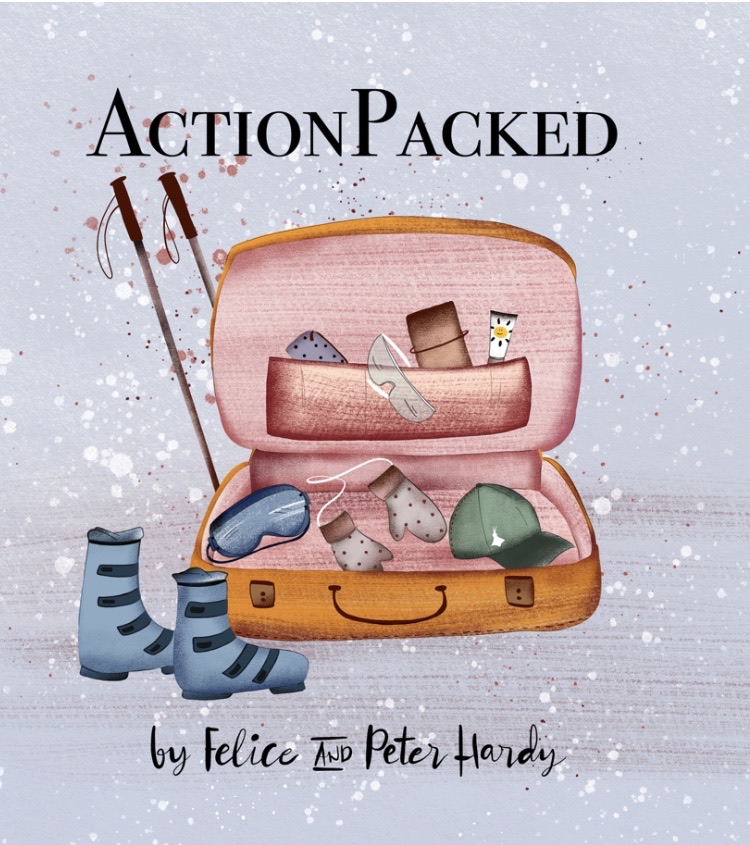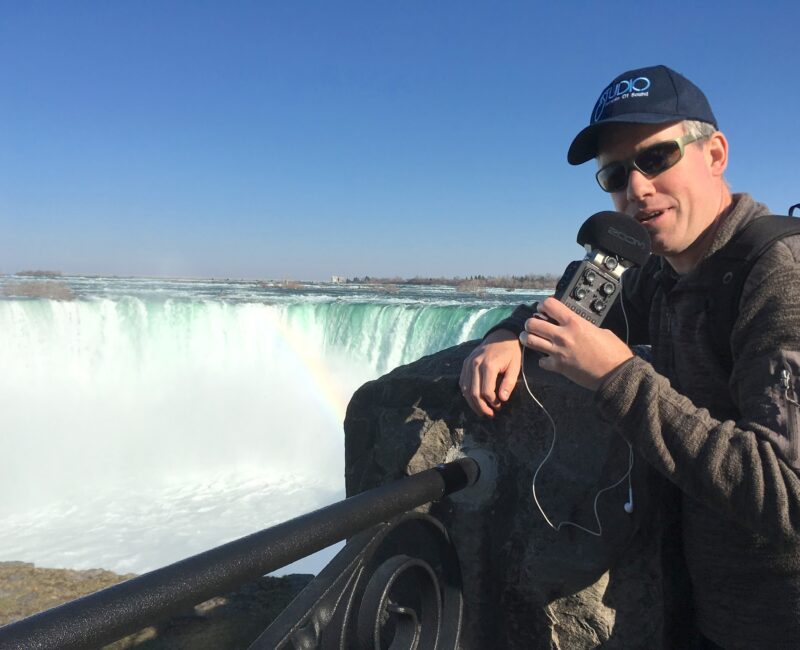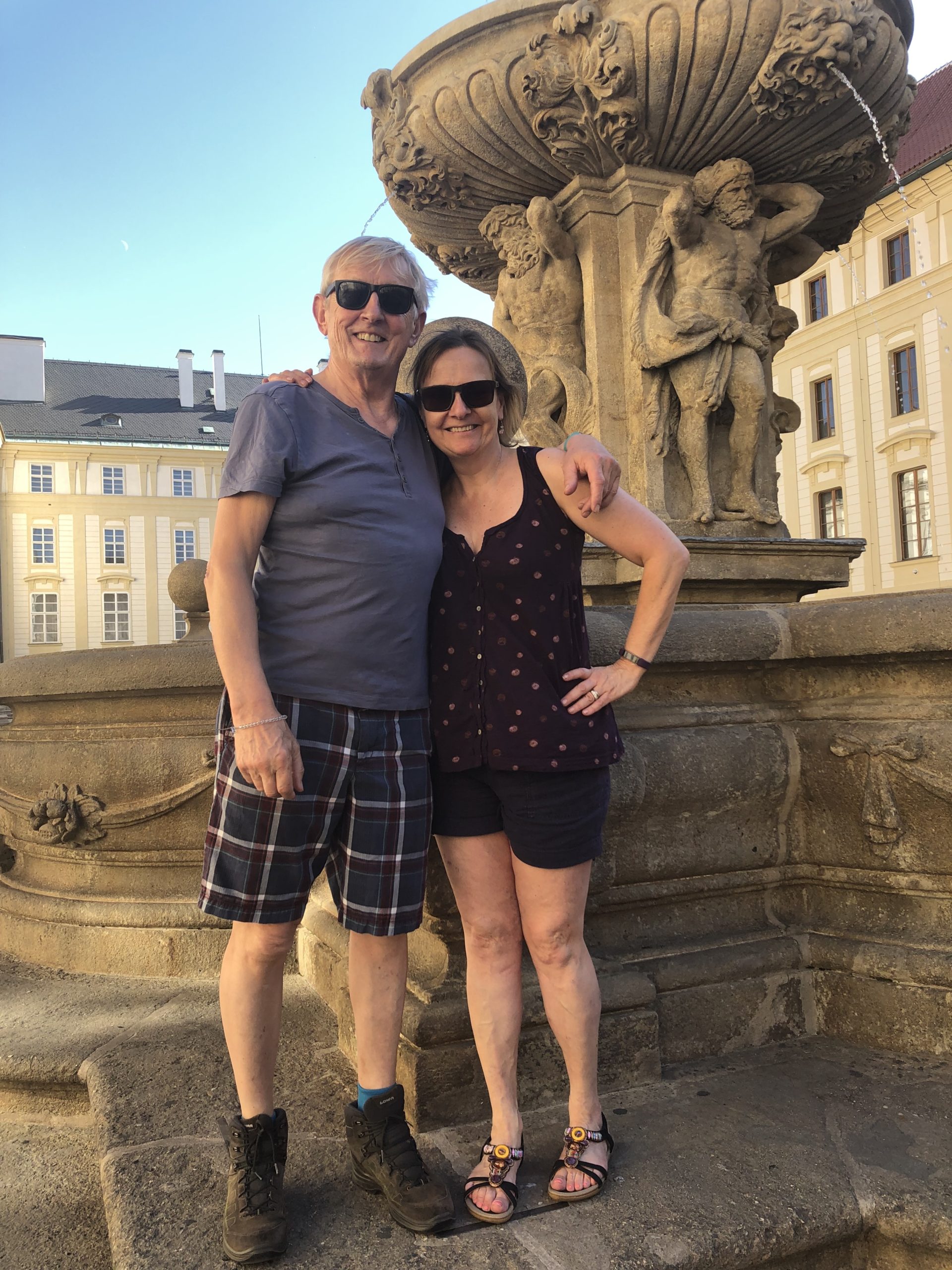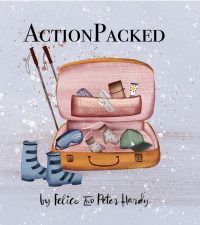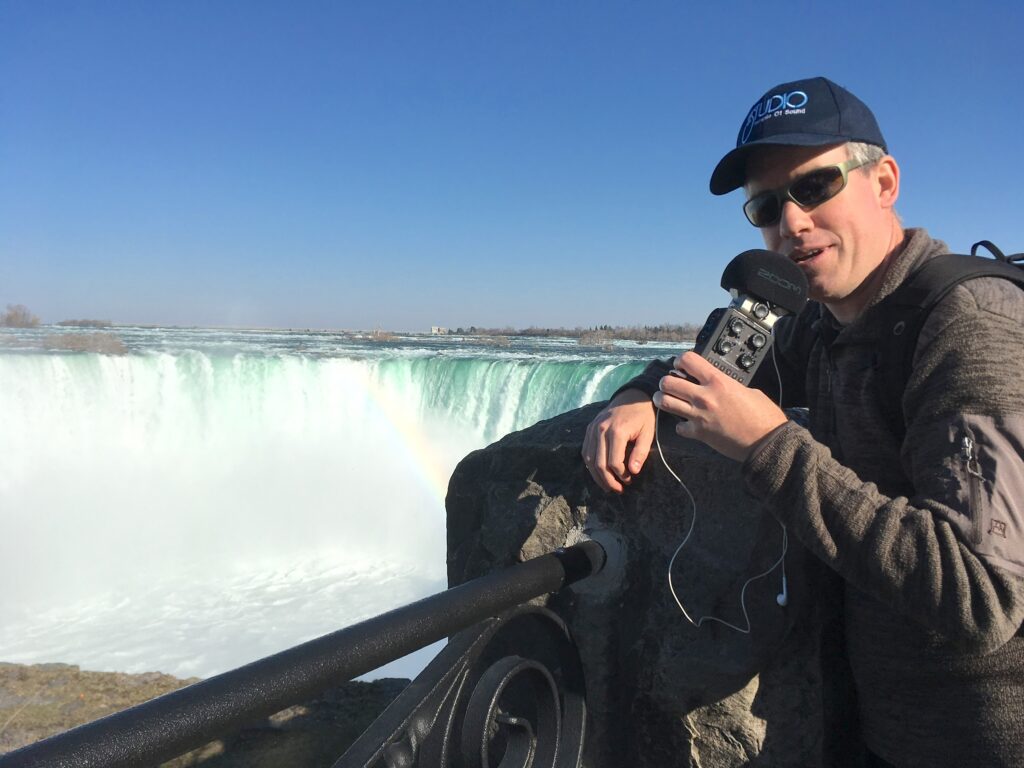
Ted at the Niagara Falls
Peter Welcome to our travel podcast. We’re specialist travel writers and we’ve spent half a lifetime exploring every corner of the world.
Felice So we want to share with you some of our extraordinary experiences and the amazing people we’ve met along the way.
Peter There are those of us out there in the ether, like Action Packed Travel, who make podcasts about all aspects of travel, both domestic and international, all over the world. And then and then there’s Ted Cragg in Quebec, who makes podcast episodes about travel podcasts. His podcast is called Travel Podcast The World. Ted, welcome to the show.
Ted Thanks very much. Great to be here.
Peter Now, tell us about what’s been happening here? What is your podcast, which has launched quite recently? We think it’s great, but tell us what you’re trying to do out there?
Ted Thanks. Well, I have been a fan of podcasts for years just listening to them, and I got into audio production myself and I as part of that process. Of course, I listen to lots of travel podcasts, and I kind of realised that there wasn’t any one in particular – or any kind of place – where people could really discover and learn more about the travel-themed podcast that were out there. So I thought, well, this is a great opportunity to explore that, to profile the people creating these shows…to really kind of validate and give some recognition to the hard work that we do and just try to give them more exposure for us over time as my show grows. But that’s kind of the idea is to be a bit of a central hub for people to discover new travel podcasts or to learn about ones they may know about already…to learn about the host and some of their background. And of course, we chat a little bit about what it takes to create a podcast and a travel-themed one in particular.
Felice So in your experience, do people listen to several travel podcasts or just have a favourite?
Ted Well, I would say it’s probably similar to a lot of niches, really. But you know, travel is such a wonderfully broad subject. There’s so many different things you can explore within it, which really gives me a lot of momentum with my own show because there’s lots and lots of different subjects, so it’s actually a good point. You know, people may be interested in learning about a particular destination, a country, a culture, but they may also be interested in kind of lifestyle topics do and perhaps working abroad. Perhaps how to travel as a family, perhaps languages, music, sports – you guys are a good example – and so likely within the list of shows that they listen to there’s probably quite a few that are travel based or at least touch on travel a bit.
Peter Yes, we have a very diverse kind of podcast with all sorts of different subjects.
Felice Interviewing people or going on location when we can.
Peter And what really fascinates me each week is just how many listeners we have in different countries. I think the score we got to is how many countries now?
Felice Eighty five.
Peter So what’s the latest?
Felice Malawi. And so yours is just one of many different jobs you can have in travel because we’ve featured quite a few different people who spend all their time doing things to do with travel, not just going on vacation but actually finding a way to work in that area as well. So is that what you plan to do?
Ted Yes, that’s it, and I really resonate with focus you guys put on that, at least from time to time. I enjoyed your episode from August 2021 about being a digital nomad, and I kind of aspire to that too, and not necessarily to be travelling all the time, you know, there’s people who live abroad and work abroad …as long as you have a computer and internet, really. I mean, I’m happy to have a nice home base; my wife and I have two young kids and all the rest. So it’s just nice to have that option; the possibility that maybe we could travel a bit longer, maybe we could live abroad for a year and give the kids an amazing experience. And as long as I have my laptop and my basic equipment for podcasting and reasonable internet, then I can work from anywhere.
So that’s what’s as much as anything has drawn me to doing the audio production as a skill, as a business that I can put together. Plus, it’s such interesting, fascinating topics and conversation. And, as you say, the people that you meet from all around the world. So it’s a really, really nice combination.
Felice We love that one minute we’re talking to someone in Sydney, Australia, and the next we’re talking to someone in Quebec, in Canada.
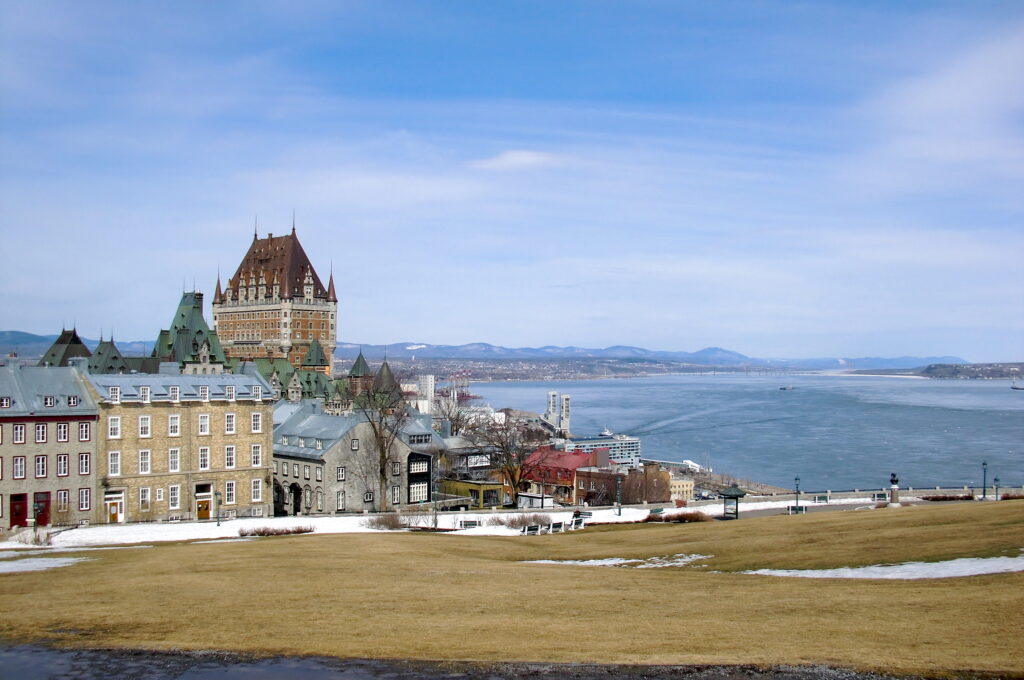
Quebec City. Photo: © Ted Cragg
Ted Yes, it’s great. As long as you can figure out the time difference – that’s always the fun part.
Felice Yes, we really had a problem with that today, didn’t we? Because there’s Canadian time and then there’s European time and then there’s UK time.
So what first attracted you to podcasting? You were listening, obviously, to lots of other podcasts apart from your own.
Ted My background is as a tour guide and as a director, so I love explaining things, I love telling stories. There’s a bit of a teaching kind of element to it, and audio is a really nice extension of that. To have the platform to really focus on explaining things, telling good stories and having great conversations – I really like doing that. I’ve really taken to interviewing. It’s such a great craft that you can always work on. You’re always improving your interviewing skills. And I really enjoy that and the chance to practice that.
So I guess when it came down to it, I mean, I enjoy writing too, and I have video…it’s a different kind of thing, you get more used to it being on screen. Audio is something that I find gives me a lot more flexibility, in terms of production, because you can do it in lots of different ways. You have a lot more freedom to explore topics, going into things a lot deeper. You don’t have the visual element, so you just don’t have to really worry about it as much. You can really focus on the content and the message and what you’re going to say, and not have to necessarily kind of package and present it in a certain way that you would with video. So, yes, audio just appealed to me more than anything as a way to meet people and talk about great topics and have those conversations.
Peter Certainly we talk to each other a lot of the time. It’s quite easy with audio because we just have a chat about what we’re doing and what we’re seeing, and discuss it between ourselves – and you’ve got the start of a podcast.
Ted Then you think about podcasting too, I like the versatility of it. People generally listen to podcasts…they might be driving, going for a walk, exercising, washing dishes or cooking and all that. You can multitask. You can be doing something else while you’re listening to a podcast and not have to think about: ‘I have to, like, sit down and watch a video,’ you can be doing something else and yet still be paying attention. Or of course, you can go and sit down in a nice, comfortable chair with a cup of coffee and and really immerse yourself in the conversation you’re listening to as well.
Peter So have you done a lot of travel personally or is it mainly virtual travel for you?
Ted Yes, I certainly travelled a lot in my younger days before the kids and everything, but I really made a point of it. I have to say, like when I finished university here in Canada, I remember I sat down on my couch at home and I pulled out a map of Canada the next day after I finished and I was like, ‘OK, where am I going to go first?’
So I really wanted to explore Canada. I had been to Europe a couple of times and had been around the States, but I hadn’t seen so much of my own country – it’s such a big country, of course. I wanted to really live and be in places around Canada. So I lived in Halifax, Nova Scotia, for a little bit and then I found my way out to Alberta, to the Rocky Mountains, and that kind of became my second home for quite a few years. I lived in Lake Louise.
I lived in Jasper National Park – that’s where if anyone’s been there, you may know about the Columbia Icefield, which is the big glacier. And it’s a famous thing as they have these big monster tyre buses that drive on the glacier and do tours. So I managed to get a job driving the bus. That was kind of my gig for quite a few summers. And hey, that’s where I met my wife, and that’s where I met lots and lots of wonderful friends. It’s just an amazing experience. The crazy job, like, there’s no other job like it driving this huge bus right on top of a glacier like,
Peter Well, we’ve been there. Perhaps you drove us.
Felice Yes, we went in one of them, but we went in the winter. We were staying in Jasper, and it was amazing. Yes, it was incredible; that area is so beautiful.
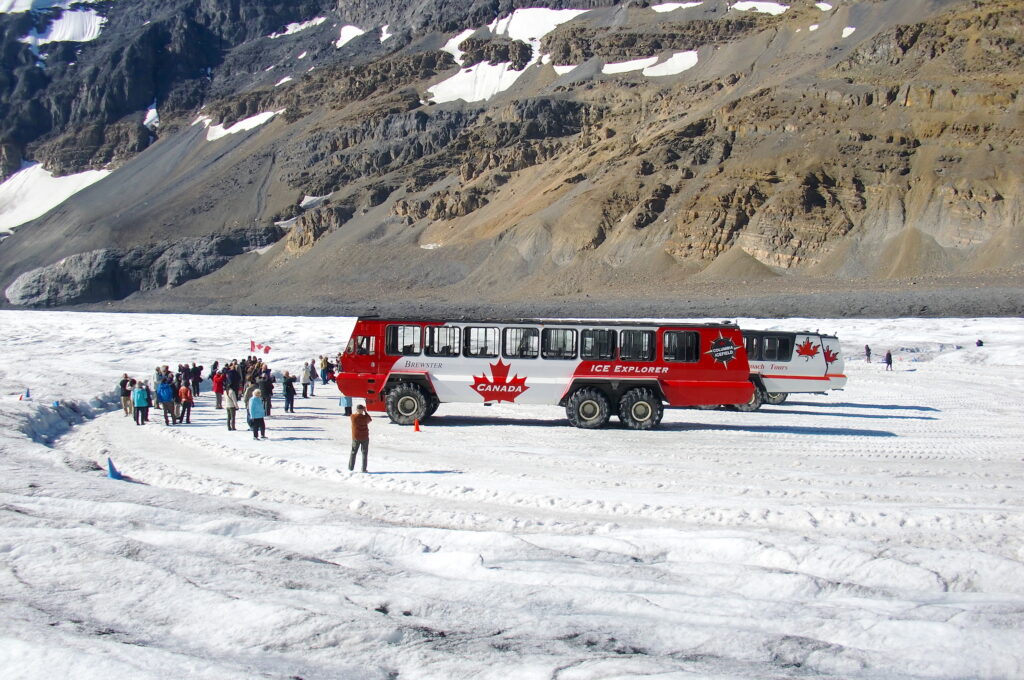
Columbia Icefield
Ted One of the most amazing things being there was just the ice field itself. The attraction is quite far from anywhere else, like Jasper is the closest town and it’s a good hour drive away. So we would have staff accommodation, all of us staff would be about maybe 100 of us living on site. The tourists would come through and there’d be thousands of people on site during the day. But then they’d all head on to the nearest town, back to the hotels, and we’d have the whole place to ourselves for the rest of the evening. It was just wonderful, you know, and it stays light out quite late to be light until 10:30,11:00 at night. They provide our meals and our accommodation. So I’d work an eight-hour shift. I’m home, dinner’s ready and then you can go off and do a great hike for two or three hours and explore the mountains. So it’s a wonderful, wonderful place.
Felice So were there any places to shop there? How did you get food?
Ted Well, that’s just it. I mean, they had to really provide meals and accommodation, full room and board for staff, or else it just wouldn’t be practical for people to work there. And I learned…I was there for, I guess, four summers in total and I did learn to really prepare. You come with your supplies for the season, for six months, as best you can. You bring lots of toothpaste, toothbrush and soap and shampoo and all that stuff. We would do like shopping trips to the nearest town every once in a while; just take one of our buses, a highway coach, and do a service kind of trip. But it was best to plan ahead.
And the flip side was that you’d save lots of money, and I later on went off to Australia, New Zealand and had saved lots of money. It’s because I worked at the ice field there where you just don’t spend any money. So that was one of my stops. But I also made a point of being in Vancouver for the Winter Olympics in 2010. So I did spend about a year and a half there. I worked as a tour guide in the city and took people around town and up to Whistler and to Victoria. And that was pretty cool, too. That really helped expand my tour guiding experience, meet lots of people, of course. And ultimately I was there for the Olympics, which is pretty neat.
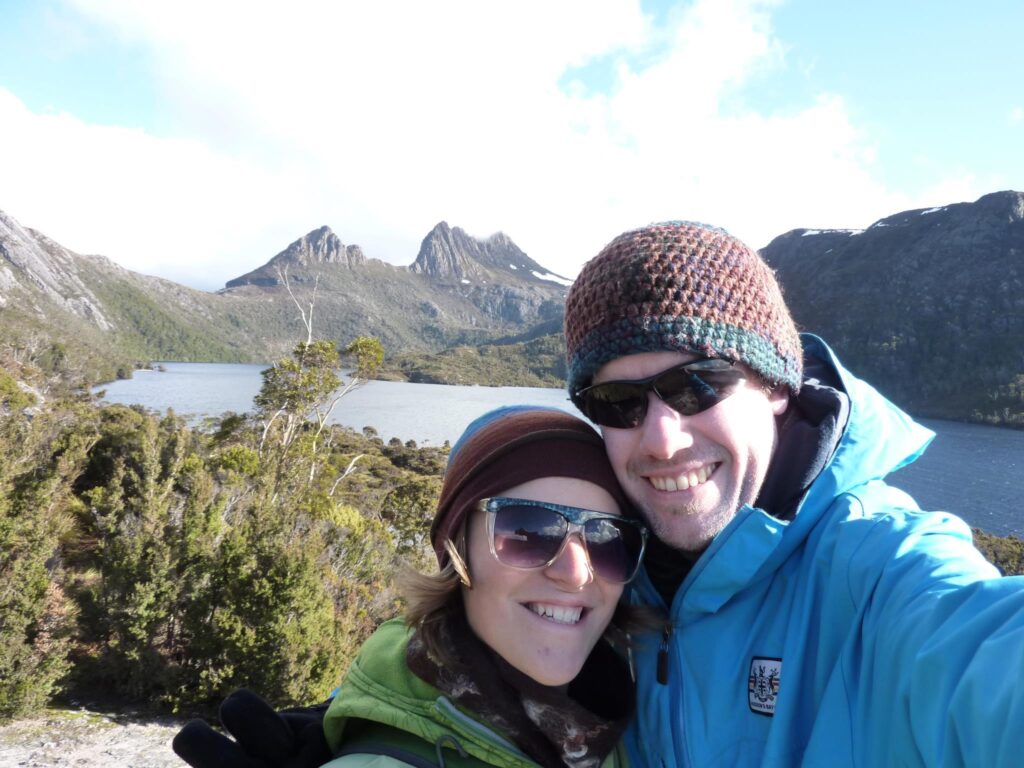
Ted and Emilie at Cradle Mountain, Tasmania
Felice That must be great, Whistler is one of our favourite resorts.
Peter Yes, absolutely. And we love Quebec too, I love the East Coast as well.
Felice It’s very cold, though, where you live.
Ted Yes.
Felice I’ve never been as cold as I’ve been in Mont-Saint-Anne, I think. The only time I’ve actually had to be make myself go inside…well, not make myself…I had to go inside…was Mont-Saint-Anne near Quebec City because my face was so cold.
Ted Oh yes, you have to be careful for sure. If it’s really, really cold, we’re talking minus 20 Celsius, around zero Fahrenheit, you can only expose your skin for 20, 30 minutes.
Peter Yes, sure. And years and years and years ago, when plastic ski books were being first developed, the boots used to crack in extreme cold and used to be a pretty serious problem. And I could tell you that Quebec was the first place to invent boot muffs. You actually have a covering on your boot to keep the chill out. Useful things, actually.
Felice So how do you keep warm in winter?
Ted The main thing is to dress appropriately, so you do need thick enough coats, thick enough boots and gloves. The other thing is to be prepared for layers. So in skiing this would be a big part of it, you might start off your coat but you have to have certain layers that you take off and then you might be down to like a vest or something on a nice sunny afternoon in the snow. But yes, it’s really just being prepared for it.
All that being said, we’re used to it here in Quebec, in Canada, but a lot of people get pretty tired of winter by the time you get around to the end of February, early March, it’s been four months, really bitter cold. People will take off to warmer places if they can for at least a week or something, and it’s not like we necessarily love it. There’s good things and there’s bad things about the winter. You can do wonderful stuff outside, but we’re always looking forward to the spring and the summer, and that’s a flip side. I mean, the summers here are stunning, they’re warm, lots of things to do: camping, swimming. So it’s amazing having real proper four seasons, four quite distinct seasons in a climate like this.
Felice So is it warm enough to swim outdoors in Canada in summer?
Ted Absolutely. You wouldn’t really jump in until kind of late June maybe, mid-June, depending on the weather. But yes, lots of people have cottages or access to a cottage and other lakes and public beaches, beautiful fresh, clean water. And for sure, people do camping and swimming all the time.
Peter I think a lot of people didn’t realise just how big a country Canada is, I think. Am I right in saying you’ve got the longest land border in the world?
Ted Yes, that’s true. Yes, the United States and Canada we have four and a half well, technically five time zones. Newfoundland is half an hour ahead of of Nova Scotia, for example.
Peter I had a crazy few weeks some years ago now when I was writing a book about James Blunt, the singer, and I was travelling with him when his band. We did a major tour of Canada and we started in Vancouver and we ended in Quebec, and we wanted to go to towns where he had fans but they didn’t get to the big cities, so he took himself to them rather than otherwise. I can’t remember where we went, but we went to these small remote towns all over Canada. Huge drives between them and it was on one of them that I came away with an impression of incredibly friendly people. Canadians are,
Ted Yes, we’re very welcoming. You know, we’re curious, we like to see people come and explore our country, for sure.
Felice So have you travelled outside Canada quite a lot?
Ted So I got to a point, you can always see more, of course, Canada and your own country. But I got to a point where I realised if I’m going to travel more abroad than it was time, and I remember I was doing a tour in Vancouver. This would have been late 2009. I was sitting in traffic – Vancouver is beautiful, but the traffic is terrible – I was sitting there doing my tour and stuck in traffic, and I thought, do I really want to keep doing this for however many, few years? Or is this going to be my chance to travel to Australia and New Zealand, which had been on my mind for years? I was still young enough to be able to get a work permit there easily. So I remember that moment because that’s when I decided I’m going to do it, I’m going to go.
It took a while. I had to save some money and change jobs and all the rest. But I made it. It was in March of 2011 that I arrived in Sydney and started travelling around Australia for a few weeks. I guess a couple of months, really. I travelled quite a bit and I ended up in Perth in the end and found a room in a flat there with a guy and got a job at the local grocery store, delivering groceries door to door. I’d drive a little refrigerator truck, which is great. I got to see the whole city, I got to meet lots of people and the locals and they’d show me around their house and stuff and I saved lots of money too.
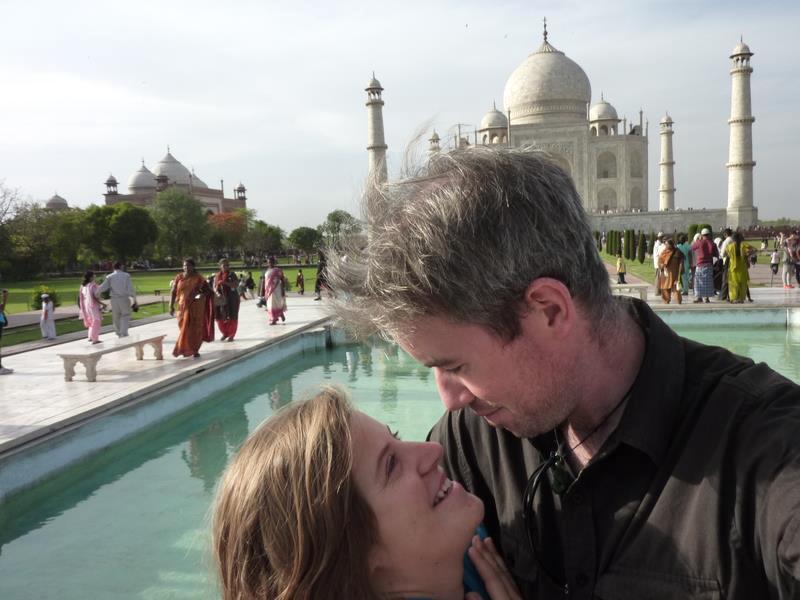
Ted and his wife, Emilie, at the Taj Mahal
My wife came and joined me after a few months. She’s a teacher, so she finished her school year. She came and joined me. We travelled a bit more in Australia. Then we spent four months in New Zealand, which is also stunning, and we had some friends there, so we stayed with them. We bought a little car, we travelled and saw the whole country over four months and then we headed off for Singapore, and we spent a couple of months throughout Southeast Asia and then five weeks in India – northern India, and we came back through Istanbul a few days in Paris and back to Montreal. So it took me about 15 months, but I went all around the world in one direction.
Felice That sounds amazing. So do you get to travel now with kids?
Ted Well, the last few years, if we’ve travelled with kids, it’s kind of been local trips or a little bit of resorts in the winter, often just like family trips to Cuba and things like that, which is OK. I never really was a resort person, but sometimes it’s nice to just kind of chill out with the kids in the swimming pool and the beach. So yes, at this point, it’s really something we aspire to.
Felice So is it easier for you from Canada to get to somewhere like Cuba than it is to get to Europe?
Ted It can be, I guess, especially when it comes to like these package resorts. Cuba is the most affordable and it’s very popular with Canadians, not just because of the price, but it’s not a particularly long flight, I think maybe three or four hours, depending where you’re coming from. And it’s kind of bizarre, too, because when you go to Cuba there’s no Americans and it’s just a different kind of feeling. I mean, it’s not bad or good, it’s just different. You know, you go to a Cuban resort and it’s 80% Canadian, and there’d be a few people from France and the UK and Germany. But I mean, it’s like a little piece of Canada – in the middle of our winter we’ve all escaped down to the Caribbean.
Peter I didn’t know that at all.
Felice It makes me want to go there more.
Peter I’ve never actually been there.
Felice Yes, me neither.
Ted Cuba’s beautiful. The people are wonderful and the culture and the music and everything. It’s a neat experience. And of course, if you have the chance to get out and explore a little bit beyond the resorts.
Felice What’s your most recent job in travel?
Ted And this kind of comes back to like, I suppose, recent travels and our future plans because the last few years I ended up working for the park service here in Canada, Parks Canada, and I live across the river from Ottawa. I live in Quebec, but across the river from Ottawa, which is in Ontario. In Ottawa, there’s a historic canal called the Rideau Canal. It’s a national historic site and a UNESCO World Heritage Site actually, too. And so it’s a very functioning canal. It’s the oldest canal of its type in North America. It’s all hand-operated, manually. We open the gates and we turn the crank and flush the water through, and there’s quite a lot of pleasure boat traffic that’ll come through and use the canal.
It basically connects Ottawa to Kingston, which is on Lake Ontario, and it’s all part of the secure, circuitous route that takes boats from Montreal and they kind of go up and around and it can end up in Toronto, and there’s quite a lot of waterways that are connected all the way down into the state. You can take your boat from Florida all the way up to Ottawa, basically, and never have to take it out. It’s all connected by various waterways and canals.
Felice I had no idea.
Ted It’s amazing once you learn about it, and there’s people – they call them loopers because it’s called the Great Loop and it can take…if you’re really dedicated…I think it takes about six or seven months to do the whole thing. Usually you’d start in Florida and you make your way up the eastern seaboard and into Canada, and eventually you get up into Lake Huron and then down into Lake Michigan to Chicago. There’s the Chicago Ship Canal that goes across through the Mississippi, and then you go down and have a couple options – you end up in the Gulf of Mexico.
Peter Sounds like a huge road trip with no road, I guess.
Ted Yes. Some people do it in like two or three years. You know, they’ll do a little stint and then they’ll keep their boat somewhere for the winter, and then come back and pick it up the next year. So we would see a lot of these people coming through the canal. And that’s the job I ended up doing. I was one of the lock masters the last few years at the Ottawa Locks, which is right in downtown Ottawa.
If you’ve been to Ottawa or if you see really any kind of postcards or pictures, anything like that, you’ll see the Ottawa Locks front and centre and it’s this flight of eight locks in a row. It takes boats a couple hours to get through. The whole thing again is hand operated and it’s kind of the focal point of the whole system. So we get lots of tourists, of course, certainly in normal times, especially people from all around the world coming to check this thing out.
It was kind of fun for me. It tapped into my tour guide background – you do a lot of interpretation explaining how things work, but also actually running the site very much hands on, you know, looking after the equipment and making sure the boats get through. So that’s been my job the last few summers, which has been good, it’s been fun, but of course, it’s very intense. So I would only work in the summer because the whole thing is frozen solid in the winter. I would be working all summer and I wouldn’t have much time with my family in the summer. My wife’s a teacher, so we’re looking forward to having more chance to travel over the coming years as I move more into my podcast production.
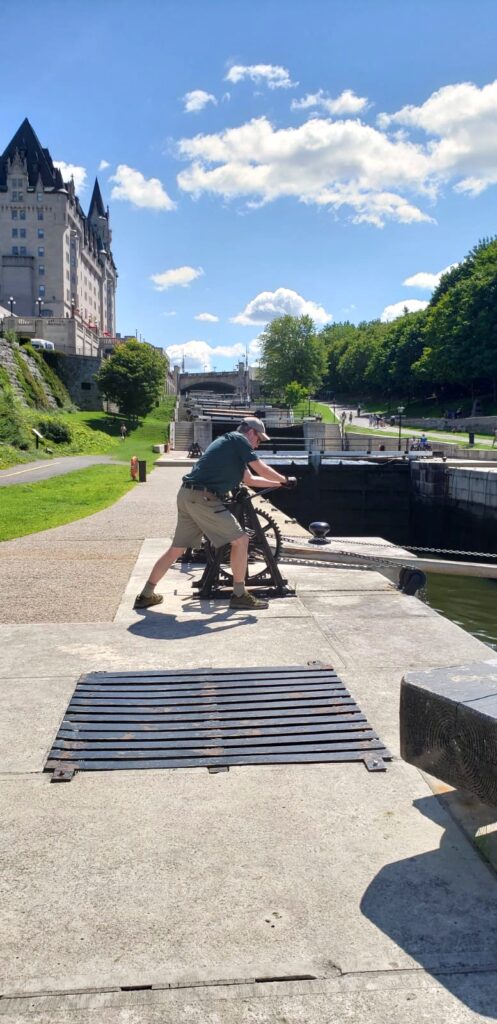
Ted working at the Rideau Canal
Felice That sounds great, but tell me, is it a really physical job? You have to mend locks and I don’t really understand about it…obviously being on a canal.
Ted Well, essentially there’s kind of two big mechanisms, there’s big cranks that you push around to either open the sluice valves which lets the water through, and there’s tunnels that go around the lock gates, so the water will go around the gates into the next chamber and you open these sluice valves, which are like like a trap door down at the bottom of the lock.
So that can be quite heavy. You know, you’ve got thousands of litres of water against this, and it takes quite a bit of effort to open that. And then once the locks, the water equals out on both sides of the gates of each chamber, there’s no pressure holding the gates closed, so you can just open the gates. It still takes some effort for sure, but once this equals, then it’s fairly straightforward, so you’d open the gates the boats would come through and close the gates behind them. And because there’s eight locks in a row, you have to keep doing it again and again and again until you either get to the top or the bottom.
Felice So do you jump on all the boats yourself?
Ted No, that’s the thing. I know that in Europe, a lot of boaters would tell us this how they would have to lock themselves through if it’s a smaller lock or maybe have other staff. But in our case, boaters have to have control of their boat. I mean, we’ll help them, of course, if it’s windy or if they need help. But essentially they they bring their boat through the lock and we just operate the mechanism.
Felice We’ve been on the Kennett Canal, which is a big canal here in southeast England, but you have to do it all yourself. You have to get people…we rented a boat, but we just had to jump on and off all the time.
Peter Well, we find actually having teenage children with the advantage. Can you sit with a glass of wine?
Ted Yes, that’s how you do it. I’ve seen the pictures and videos, the canals in England and other places, and they’re smaller. I mean, it’s still some physical work, but it’s not nearly the extreme that we have here in the Rideau Canal, which is about the limit of what you can do physically, manually. Beyond that, you’d really have to have hydraulics.
This was all built back in the early 1800s within 32 years or so. So it’s coming up on 200 years old. And it was all designed for military purposes, actually, to be able to get British troops at the time away from the American border and a bit further north. Nowadays, it’s all pleasure boats.
Felice Working on canals has that helped shape the person that you are today?
Ted Hmm…I suppose. I think it was a nice progression from the work I had been doing the last the ten years or so before that as a tour guide and a tour director. So it was nice to stay in one place. People come to me instead of me going with them, which I also like. But it was nice being in one place and then you really, really get the nuances of a place, you know, the finer, finer details because you’re there all the time.
Peter So where do you see yourself going with this podcast over the next few years? Where will you be in five years time?
Ted Well, the long term goal, I guess, as a business and professionally, is really to help more people either create travel-themed podcasts or certainly sustain them. Because as you and I know, I mean, it’s a lot of work to keep these things going and eventually, well, you either need to monetise or find some help and so on to really sustain it. So I really want to help people do that, make the business case for it, but ultimately just get more and good quality travel podcasts out there because I think it’s a bit of an untapped niche or something that can be kind of promoted and explored some more, content wise.
Peter So how will you monetise your own podcast? Can you make money out of a podcast about podcasts?
Ted Well, in my case, it’s a bit of a marketing angle for me. It’s a bit of a platform because it allows me to connect with people in the industry and chat about their show already, or even just the the possibility of a show if they want to explore perhaps converting a blog or even YouTube to a dedicated podcast, so we can talk about that. So for me, it’s kind of a way to make those connections and ultimately look for clients and think of other opportunities too over the long term.
Maybe I’ll develop a course or some other kind of training or coaching. I’d like to do that. I’ve been doing this as a side hustle, really for the last couple of years or so because I’ve been still doing my summer job. And with the summer job, I’d be working six or seven days a week, 10 hours a day. It was hard to juggle much else at the same time. So now I’m really getting into the podcasting full time.
Felice If people want to find out more about your podcast, where do they look?
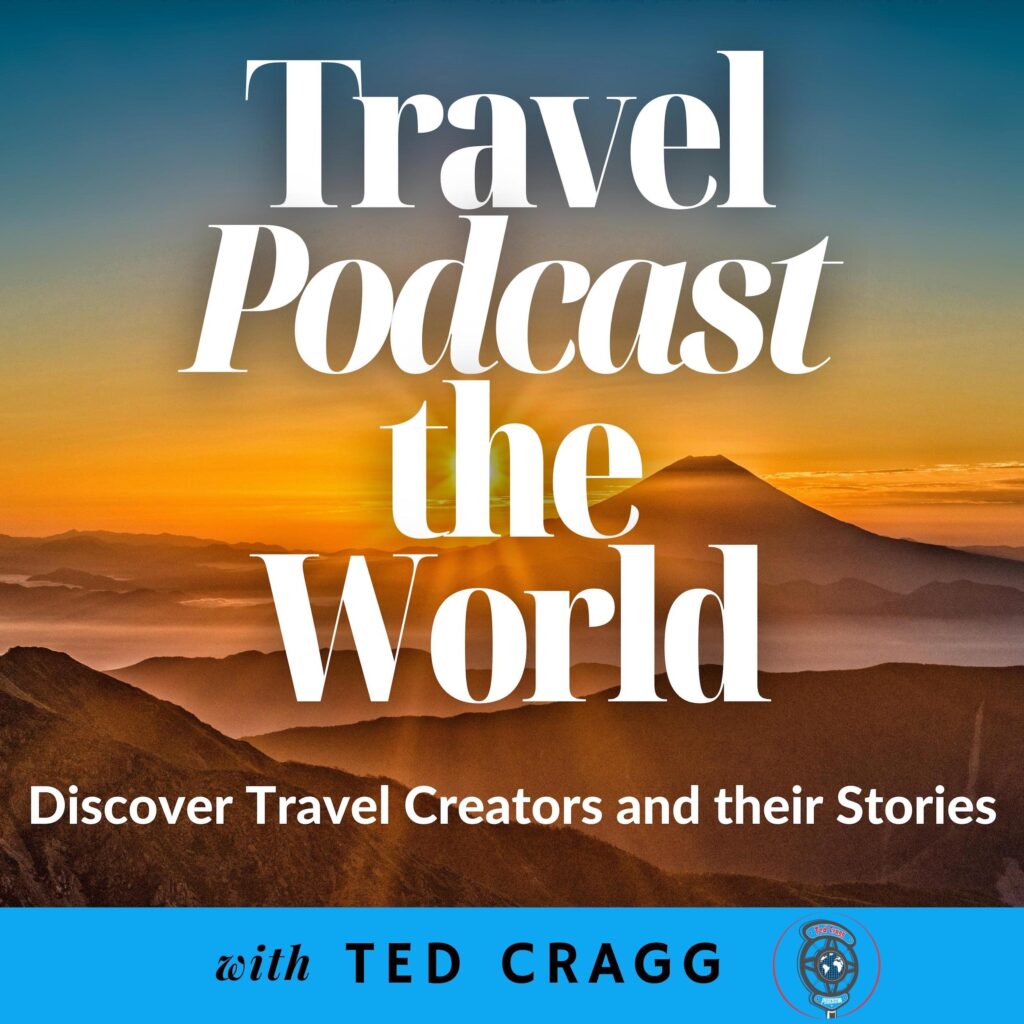
Ted Well, for starters, I have a website and it’s the same name as the show, so TravelPodcastTheWorld.com and that’ll take you to the show website. You can find the episodes, you can contact me, but you can also suggest podcast that you’d like me to profile. You know, I’m certainly on the lookout for people that I want to chat with, and I invite them on the show. But there’s lots of stuff out there.
So if anyone’s listening, if they want to suggest, you should talk to so-and-so and this podcast…go for it. Send me a message and I’ll be in touch with them and and we’ll carry on. There, so it’s a great starting point for the show.
Peter So will you help people set up a podcast initially? I mean, a lot of people would like to do it, but they don’t know how you set about getting it hosted or whatever.
Ted Yes, exactly. That kind of comes back to, I guess, the variety of this type of work, which I really enjoy. You can help people just do their audio editing and production, and that’s fine, I really enjoy that. But I also really like helping people develop and plan what they’re going to say and their message and how they’re going to structure it and who it’s for and why they’re doing it, what their objectives are. And that really comes back to preparing and launching a show.
So that’s generally about a four-week process, depends how much time you have, and flexibility, but generally it takes about a month to put something together where we would plan all that out and have some brainstorming sessions. And of course, I’d tell you all about the tech side and what you need to prepare and how the production would go.
Then we usually start a podcast with three episodes is the average, you can do a bit more, but it’s nice to have three because when you launch a show, people find it and they like it, they want to listen to more. So it’s nice to start with three episodes, so I help to get that ready. And we basically get the show started. We find some music, we get some cover art and all of that and then launch the show. And then from there, people can sustain it themselves. Or of course I can help them keep the show going in other ways, too. But I really like that variety. It’s nice having different parts of the whole podcasting project, I guess that I can work on, depending on what people need.
Peter Yes, a big surprise to me certainly, over the last year or two years has been the extraordinary friendliness of people inside the podcast industry. Everybody’s out to help everybody else, whereas in my normal day to day journalism, it’s just all rivalry-rivalry. But it’s extraordinary the way people come together in the podcasting community.
Ted Yes, it’s kind of like what we’re doing right now. When you guest, when you have a show and you are a guest on someone else’s show and then they can be a guest on your show as well. It’s just a great way to kind of cross-promote, make those connections. You never know what kind of network you can make, and the exposure. I have to say, it’s a really another really great appeal, an asset to getting into this work is the community and just the positive environment.
Peter Ted Cragg, thank you very much for coming on the show today, and we wish you the very best of luck in the future with your podcast about travel podcasts.
Ted Thank you very much. It’s been a pleasure.
That’s all for now. If you’ve enjoyed the show, please share this episode with at least one other person! Do also subscribe on Spotify, i-Tunes or any of the many podcast providers – where you can give us a rating. You can subscribe on Spotify, Apple Podcasts or any of the many podcast platforms. You can also find us on Twitter, Facebook and Instagram. We’d love you to sign up for our regular emails to [email protected]. Until next week, stay safe.
© ActionPacked Travel
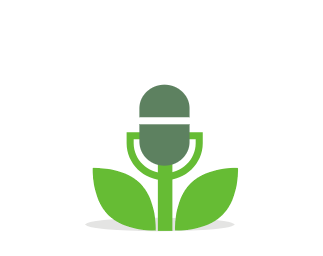
- Join over a hundred thousand podcasters already using Buzzsprout to get their message out to the world.
- Following the link lets Buzzsprout know we sent you, gets you a $20 Amazon gift card if you sign up for a paid plan, and helps support our show.
